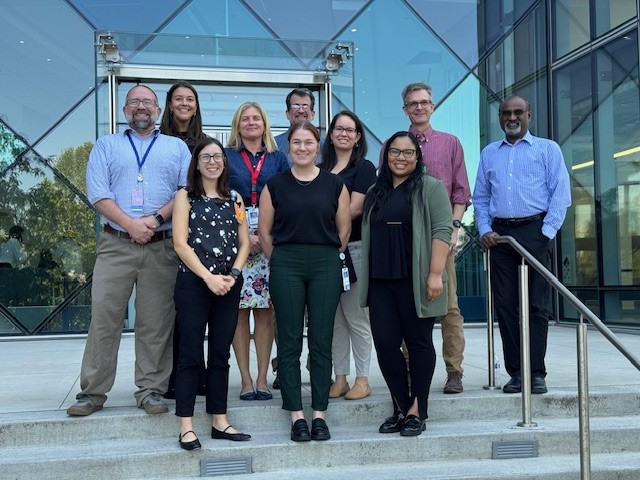Jennifer E. Schuster, MD, MSCI
Professor of Pediatrics, University of Missouri-Kansas City School of Medicine; Education Assistant Professor of Pediatrics, University of Kansas School of Medicine
Full BiographyJennifer L. Goldman, MD
Associate Program Director, Clinical Pharmacology; Professor of Pediatrics, University of Missouri-Kansas City School of Medicine; Research Assistant Professor of Pediatrics, University of Kansas School of Medicine
Full BiographyRangaraj Selvarangan, PhD, BVSc, DABMM, FIDSA, FAAM
William R. Brown, Missouri Endowed Chair; Division Director, Emerging Infections, Children's Mercy Research Institute; Director, Microbiology & Virology Laboratories; Professor of Pathology, University of Missouri-Kansas City School of Medicine; Clinical Professor of Pathology, University of Kansas School of Medicine
Full Biography
Jennifer Schuster, MD, MSCI, Infectious Diseases, Jennifer Goldman, MD, MSCR, Infectious Diseases, and Rangaraj Selvarangan, PhD, BVSc, DABMM, FIDSA, FAAM, Director, Emerging Infections Research, were awarded a new three-year, $11,787,024 federal contract with the Centers for Disease Control and Prevention (CDC).
The funding goes towards their project, “Impact of Ventilation and Environmental Interventions on Respiratory Viral Transmission in K-12 Schools.” It gauges the impact of ventilation and environmental factors on the spread of respiratory illnesses and investigates potential interventions that could be implemented to mitigate.
The project enrolls students and staff in the North Kansas City School District, who participate on a voluntary basis, to be involved in school-based surveillance and symptomatic respiratory viral testing. The North Kansas City School District is the only district involved in this study and was selected due to its size, diversity, and enthusiastic response to participation in the study team’s initial School KIDS project.
As the team explains, children spend approximately one-third to one-half of their day in the school setting. School-based respiratory virus outbreaks have been well documented, and mitigation measures to decrease respiratory viral transmission are varied. In some studies, ventilation and environmental modifications have been linked to improved indoor air quality (IAQ). In other studies, improved IAQ may be associated with decreased respiratory viral transmission. However, the effectiveness of ventilation and environmental interventions directly on respiratory viral transmission on an epidemiologic level is not well described.
The team plans to establish the relationship between easily measured indicators, such as IAQ and engineering (e.g., air exchange calculations) with virologic (e.g., environmental sampling for respiratory viruses, and student and staff respiratory virus surveillance) and clinical illness (e.g., student and staff absenteeism, respiratory viral testing in participating students and staff).
“Decreasing respiratory virus infection (RVI) transmission in schools is crucial to keeping students and staff healthy,” said the three investigators. “School-related RVI outbreaks can lead to staffing shortages, student absenteeism, and school closures, all resulting in learning loss. Therefore, identifying ventilation and environmental interventions that can be rapidly, effectively, and broadly implemented across various schools to decrease RVI transmission is crucial to preserving K-12 education.”

The team is uniquely qualified for this project. They have almost three years of experience performing school-based respiratory viral testing, including in the NKC School District. They have experience in respiratory virology and epidemiology to understand the burden and transmission of RVI in the school setting through their School KIDS project, along with co-investigator Brian Lee, PhD (Health Services and Outcomes Research). In collaboration with co-investigator Luke Gard, CIEC, CMC, BOC (Health School Program and Environmental Health Program), they have generated pilot ventilation data, including ventilation assessments, air exchange calculations, and monitoring of air quality in association with environmental and participant sampling for respiratory viruses. This project builds on their multidisciplinary expertise in infectious diseases, laboratory medicine, epidemiology, and environmental health.
